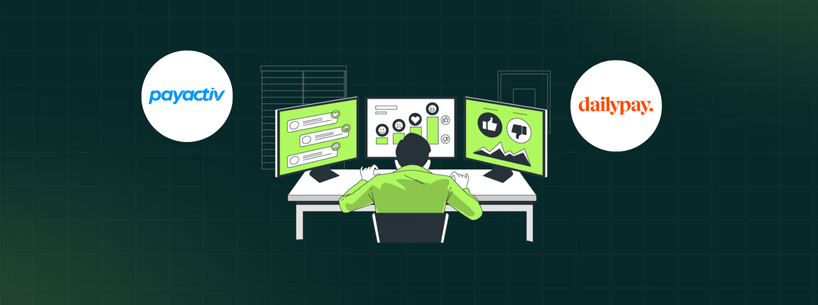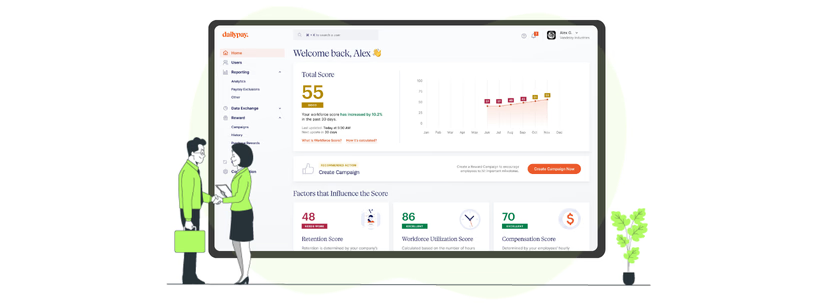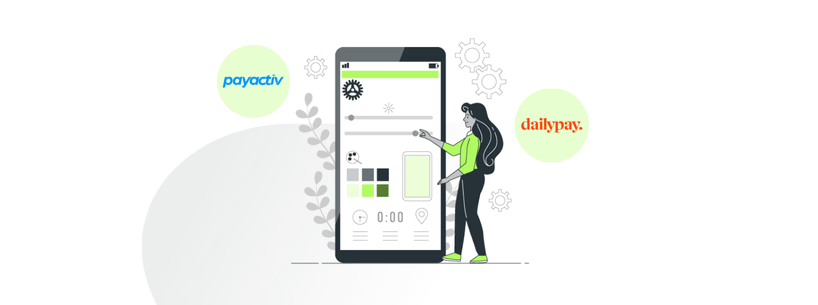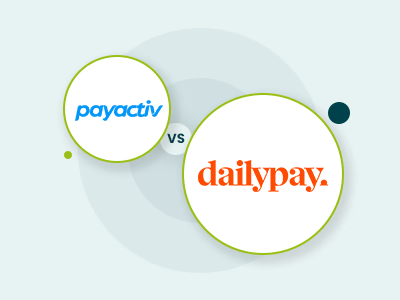
These days a growing number of workers live paycheck to paycheck, leaving them vulnerable to unexpected expenses or shortfalls before payday. This has led to HR leaders facing a new problem: they must now employ a cost-effective solution that helps employees bridge their financial gaps without encouraging any further debt.
This is where Earned Wage Access (EWA) software come in. Essentially, these tools allow employees to access earned wages before the end of a regular payroll cycle. Today, we’re going to be comparing two of these types of software: Payactiv and DailyPay.
Payactiv markets itself as a “livelihood platform” offering on-demand pay, budgeting tools, savings, and wellness features, aiming to reduce turnover and foster financial stability. In a similar fashion, DailyPay positions itself as an “on-demand pay” provider, enabling employees to withdraw from their accrued pay whenever they need, with options for instant or next-day disbursement.
In this article, we’re going to compare Payactiv and DailyPay from an HR and employer viewpoint, examining their features, benefits, limitations, and ideal use cases. By the end, you’ll have a good idea about which platform best aligns with your organization’s goals and workforce needs.
Features | ServiceNow | Workday |
On-Demand Pay | Allows employees to access a percentage of their wages | Enables employees to access 100% of their wages |
Tips | Requires linking the Payactiv Visa® Payroll Card through the app to access the tips | Fully integrates tips into its On-Demand Pay platform |
Integrations | Integrates with providers such as ADP, Paychex, and Kronos, etc. | Integrates with platforms like Paycor, Paylocity, Oracle, etc. |
Security | Compliant across all 50 states and supports multiple authentication options for secure access | Utilizes encryption protocols, multi-factor authentication and regular security audits |

Payactiv is a financial wellness and earned-wage access (EWA) platform. It’s designed to help employees access wages they’ve already earned before payday, helping them manage their finances and reduce reliance on predatory credit.
In addition to on-demand pay, it includes features such as budgeting tools, savings tools, discounts, and financial counseling—all integrated under one mobile app.
Currently used by over 1,500 companies, Payactiv markets itself as being beneficial both to employees (by offering financial flexibility and tools) and to employers (by reducing turnover, improving engagement, and offering a non-cost benefit).
Unique Payactiv Features
- Financial Counseling And Coaching: Provides access to financial coaching or counseling services to help employees plan budgets, manage debt, and improve overall financial wellness
- Bill Pay And Discounts: Payactiv’s app includes built-in bill pay, allowing users to pay recurring bills directly from their accessible earnings. It also offers a marketplace of discounts and partner deals
Payactiv Pros And Cons
Pros:
- Streamlines employee access to wages, reducing manual handling
- Offers the ability to pay bills
- The software is accepted by most carriers
Cons:
- Virtual card cannot be used on Google Play, Cashapp or Pay Pal
- Customer support can be improved

DailyPay is a leading on-demand pay solution that enables employees to access a portion of total of their wages earned before the scheduled payday. It allows employees to build an “available earnings” balance through their work and approved hours, which they can transfer to a bank account or debit card.
In addition, the software offers benefits such as the DailyPay reward—a real time cash reward that’s used to motivate employees. Other benefits include the DailyPay Visa Card, real-time access to tips, etc.
The platform also helps recruiters as it allows them to engage and retain employees by providing them with a sense of financial security. It also integrates with payroll software, HCM, and other benefit applications, meaning that it isn’t a hassle for employers to include in their payroll processes. Finally, it serves a wide variety of industries such as hospitals, restaurants, supermarkets, etc.
Unique DailyPay Features
- International Transfers: Supports sending money to more than 60 countries via its transfer feature
- Perks Marketplace: Provides curated discounts and offers aimed at helping users save on big recurring expenses
DailyPay Pros And Cons
Pros:
- Setup is simple and easy
- Showcases estimated pay after working shifts
- Accurately tracks hours and wages
Cons:
- Some users report that the app runs slower on Android compared to iOS
- Doesn’t offer cash advances

Payactiv offers custom pricing that depends on the number of users and the features required. For employees, the platform charges different amounts depending on whether the transfer is to a Payactiv VISA card or not. If a user is transferring to a Payactiv VISA card without a direct deposit of at least $200/pay period, the platform charges $2.49. Otherwise, it doesn’t charge anything. For transfers to Non-Payactiv debit cards, Walmart Cash pickups or other transfers, it charges $3.49.
Disclaimer: The pricing is subject to change.
DailyPay’s pricing structure depends on the specific requirements of your organization. For employees, the platform only charges a flat fee of $3.49 to access their earnings instantly.
Disclaimer: The pricing is subject to change.

When it comes to providing earned wage access and financial wellness, DailyPay positions itself as a comprehensive platform. With features such as full access to earned pay, digital tips, savings tools, credit health monitoring, and even international transfers, it caters well to organizations seeking a broad suite of employee financial solutions.
However, while DailyPay may be the stronger fit for companies with large, diverse workforces, Payactiv remains a compelling choice for businesses looking for a simpler, flexible, and cost-effective solution. Its fast implementation and everyday practical features like Walmart’s Direct2Cash access makes it a great choice for employers who want to enhance retention and employees who want more ease in financial matters.
In either case, the decision between Payactiv and DailyPay should come down to your organization’s specific goals. If your priority is advanced employee empowerment and financial tools, DailyPay may be the better fit. If you’re focused on accessibility and ease of use, Payactiv offers an effective and trusted solution.
